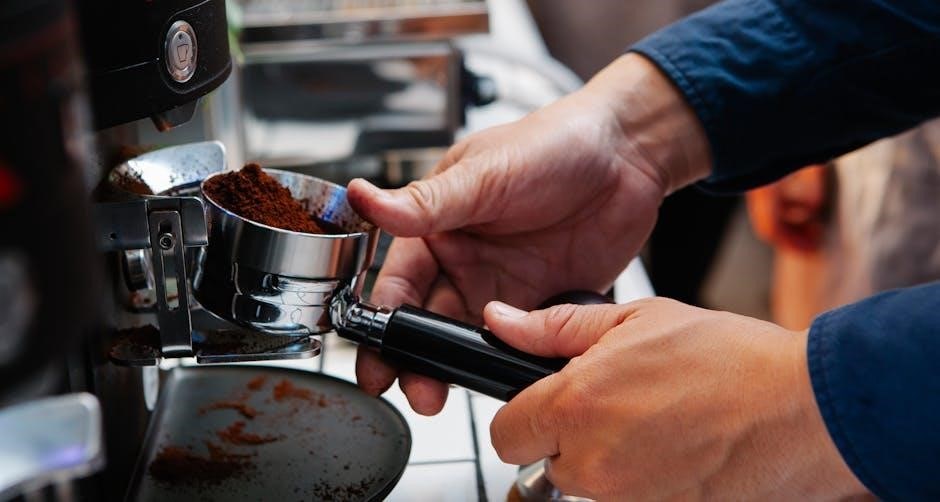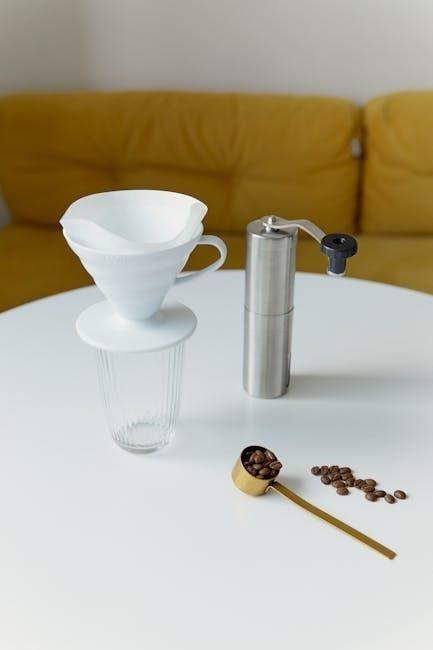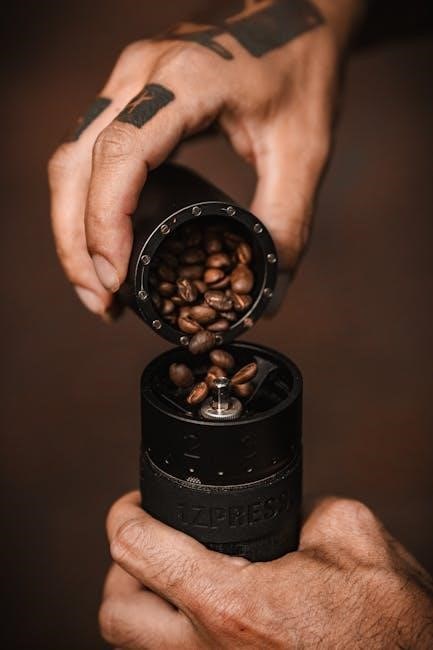Coffee grinders are essential for brewing fresh coffee, offering two main options: electric and manual. Electric grinders provide speed and convenience, while manual ones emphasize precision and eco-friendliness.
Overview of Electric and Manual Coffee Grinders
Electric and manual coffee grinders are the two primary options for coffee enthusiasts. Electric grinders offer speed and convenience, often featuring burrs or blades that quickly process coffee beans. They are ideal for those who value efficiency and ease of use, especially for large quantities. Manual grinders, on the other hand, require manual effort to grind beans, providing precise control over grind size. They are eco-friendly, cost-effective, and portable, making them a favorite among travelers and coffee purists. While electric grinders are better for daily use and high-volume grinding, manual grinders excel in delivering consistent results for smaller batches. Both options cater to different needs, ensuring fresh, high-quality coffee grounds for any brewing method.
Importance of Grinding Coffee Beans Fresh
Freshly grinding coffee beans is crucial for achieving optimal flavor and aroma. Pre-ground coffee loses its quality quickly due to exposure to air, moisture, and light. Grinding just before brewing ensures the coffee’s natural oils and essences are preserved, resulting in a more vibrant and flavorful cup. Manual grinders offer precise control over grind size, allowing for consistent results without generating heat, which can degrade the beans. Electric grinders, while faster, must be used carefully to avoid overheating. Both methods emphasize the importance of fresh grinding, as it directly impacts the final taste and aroma of the coffee. Freshly ground beans are essential for any brewing method to unlock the full potential of the coffee.
Pros and Cons of Electric Coffee Grinders
Electric coffee grinders offer speed and convenience, ideal for daily use and large quantities. However, they can generate heat and are often more expensive than manual grinders.
Advantages of Electric Coffee Grinders
Electric coffee grinders are known for their speed and convenience, making them ideal for daily use. They can handle large quantities of coffee beans efficiently, saving time for home users and professionals alike. Many models offer adjustable grind settings, allowing for customization to suit various brewing methods. High-quality electric grinders often feature durable burrs that ensure consistent grinds without generating excessive heat. Additionally, they are user-friendly, requiring minimal effort compared to manual grinders. Some advanced models include programmable features, timers, and automatic shut-off, enhancing ease of use. Overall, electric grinders are a practical choice for those prioritizing speed, convenience, and versatility in their coffee preparation routine.

Disadvantages of Electric Coffee Grinders
Electric coffee grinders have several drawbacks that may make them less appealing to some users. They can generate heat during operation, which may alter the flavor of the coffee beans; Additionally, electric grinders are generally more expensive than manual ones, especially high-quality models with advanced features. Their design often makes them bulkier and harder to store, and they require a power source, limiting portability. Cleaning can also be more challenging due to their complex mechanisms. Furthermore, some electric grinders may produce uneven grinds, particularly cheaper models with blade systems. Lastly, they are less eco-friendly compared to manual grinders, as they consume electricity and may have plastic components that are less durable over time.

Pros and Cons of Manual Coffee Grinders
Manual grinders offer precision control and eco-friendliness but require manual effort and time. They are portable, cost-effective, and produce consistent grinds, yet can be tiring for large quantities.
Advantages of Manual Coffee Grinders
Manual coffee grinders offer several benefits, including precise control over grind size and consistency. They are eco-friendly, as they require no electricity, and are often more affordable than electric grinders. Portability is another advantage, making them ideal for travelers or campers. Manual grinders also produce less heat, which helps preserve the coffee beans’ flavor and aroma. Additionally, they are quieter to operate and require minimal cleaning. For those who value the ritual of grinding, manual grinders provide a satisfying, hands-on experience. Overall, they are a great choice for coffee enthusiasts seeking a cost-effective, sustainable, and precise grinding method.
Disadvantages of Manual Coffee Grinders
Manual coffee grinders require physical effort and time, making them less convenient for large quantities or daily use. They can be tiring to operate, especially for extended periods. Grinding consistency may vary depending on the user’s technique, and achieving fine grinds for espresso can be challenging. Cleaning manual grinders is also more labor-intensive due to their multiple parts. Additionally, they are not ideal for individuals with limited strength or mobility. While they offer precision, the trade-off is in speed and efficiency, making them less practical for households with high coffee consumption or those seeking quick results.

Key Differences Between Electric and Manual Grinders
Electric grinders offer speed and convenience, while manual ones provide precision and eco-friendliness. Electric models are faster but often costlier, whereas manual grinders are budget-friendly and portable.
Design and Build Quality
Electric coffee grinders often feature modern, compact designs with digital controls and preset settings, making them sleek and user-friendly. They are typically made from durable materials like stainless steel or high-quality plastics. Manual grinders, on the other hand, emphasize simplicity and craftsmanship, frequently constructed from stainless steel, wood, or ceramic. They are designed for portability and longevity, with fewer moving parts. Electric grinders may include advanced features like timers or grind size adjustments, while manual grinders focus on precision engineering for consistent grinding. Overall, electric grinders prioritize convenience and technology, whereas manual grinders highlight durability and timeless design.
Ease of Use and Convenience
Ease of Use and Convenience
Electric coffee grinders are designed for convenience, offering quick and effortless grinding with the touch of a button. They are ideal for busy households, as they can handle large quantities efficiently. Many models feature preset settings and timers, allowing users to customize their grinding process without constant supervision. Manual grinders, while requiring more effort, provide a hands-on experience that appeals to coffee enthusiasts. They are quieter and more portable but demand manual labor, especially for larger batches. Electric grinders excel in speed and ease, making them perfect for daily use, while manual grinders cater to those who value precision and are willing to invest time in the process.
Cost and Value for Money

Manual coffee grinders are generally more affordable than electric ones, making them a budget-friendly option for coffee enthusiasts. They often deliver excellent value for money, offering consistent grind quality at a lower price point. Electric grinders, while more expensive, provide advanced features like preset settings and faster grinding, which may justify the higher cost for frequent users. Manual grinders are a cost-effective choice for those seeking a reliable, no-frills solution, while electric grinders appeal to those willing to invest in convenience and efficiency. Ultimately, the choice depends on balancing budget constraints with desired functionality and ease of use.

Maintenance and Cleaning
Manual coffee grinders are typically easier to clean and maintain due to their simple design. They often disassemble quickly, allowing for thorough washing with soap and water. Electric grinders, while convenient, require more careful maintenance. Grounds and oil from beans can accumulate inside, necessitating regular wiping and brushing. Some electric models have removable parts for easier cleaning, but others may be more complex. Manual grinders are less prone to clogging and generally easier to keep in good condition. Both types benefit from consistent cleaning to ensure optimal performance and flavor. Regular maintenance helps extend the lifespan of the grinder, whether manual or electric, and prevents old coffee residues from affecting the taste of freshly ground beans;
Portability and Storage
Manual coffee grinders are highly portable due to their compact size and lightweight design, making them ideal for travel or camping. They require no electricity, adding to their convenience on the go. Electric grinders, while larger and heavier, are less portable but often feature detachable parts for easier storage. Manual grinders typically take up less space in kitchens, while electric ones may need dedicated counter space. For travelers, manual grinders are a clear choice, whereas electric grinders are better suited for home use. Storage-wise, manual grinders are simpler to stow away, while electric models may offer features like cord storage or compact designs to save space. Portability and storage needs are key factors in choosing the right grinder for your lifestyle.
Noise Levels During Operation
Noise levels vary significantly between electric and manual coffee grinders. Electric grinders are generally louder due to their motorized operation, which can be a drawback for early morning use or in shared living spaces. Manual grinders, on the other hand, are much quieter since they rely on manual effort rather than electric motors. This makes manual grinders ideal for those who value a peaceful environment or need to grind coffee without disturbing others. While electric grinders offer speed and convenience, their noise output can be a notable inconvenience for some users. Manual grinders provide a serene grinding experience, making them a better choice for noise-sensitive individuals. Ultimately, noise preferences play a crucial role in deciding which type of grinder suits your lifestyle and surroundings.
Eco-Friendliness and Sustainability
Manual coffee grinders are often considered more eco-friendly than electric ones because they operate without electricity, reducing energy consumption. They also tend to have fewer components and no electronic parts, making them easier to recycle or repair. Electric grinders, while convenient, rely on power and may contain non-recyclable materials like plastic. Manual grinders are also more durable, lasting longer and reducing waste. For environmentally conscious consumers, manual grinders are a sustainable choice, aligning with efforts to minimize carbon footprints and reduce reliance on electricity. Their simplicity and longevity make them a greener option for coffee enthusiasts who prioritize eco-friendliness and sustainability in their daily routines.

Who Should Use Electric Coffee Grinders?

Electric coffee grinders are ideal for home users with high coffee consumption, professional baristas, and individuals with limited time or physical strength, offering speed and convenience.
Home Users with High Coffee Consumption
Electric coffee grinders are ideal for home users who consume large amounts of coffee daily. They offer speed and efficiency, allowing for quick grinding of multiple cups. With their powerful motors and large capacity, electric grinders are perfect for households that need to brew coffee frequently. They also provide consistent grind quality, which is essential for maintaining flavor. Additionally, electric grinders often come with adjustable settings, catering to various brewing methods. For busy families or individuals who value convenience, electric grinders are a practical choice, saving time and effort while ensuring a fresh cup every time. Their ease of use and efficiency make them a smart investment for high coffee consumption homes.
Professional Baristas and Coffee Shops
Professional baristas and coffee shops benefit immensely from electric coffee grinders due to their high performance and efficiency. These grinders are designed to handle large volumes of coffee beans quickly, ensuring consistent grind quality and flavor. With advanced features like precise grind control and multiple settings, electric grinders cater to various brewing methods, from espresso to pour-over. Their durability and robust construction make them suitable for heavy-duty use in commercial environments. Additionally, electric grinders save time, allowing baristas to focus on crafting exceptional beverages. For professionals who prioritize speed, consistency, and versatility, electric grinders are an indispensable tool, enhancing both productivity and the quality of the coffee served.

Individuals with Limited Time or Strength
Electric coffee grinders are ideal for individuals with limited time or physical strength. They offer a quick and effortless grinding process, eliminating the need for manual effort. This makes them perfect for those who struggle with repetitive tasks or lack the energy for manual grinding. Electric grinders are also faster, allowing users to prepare coffee quickly, even during busy mornings. Their ease of use ensures that anyone can achieve consistent results without physical strain. For those prioritizing convenience and efficiency, electric grinders are a practical choice, providing high-quality grinds with minimal effort required. They are a time-saving solution for individuals seeking to enjoy fresh coffee without compromising on flavor or convenience.
Who Should Use Manual Coffee Grinders?
Manual coffee grinders are perfect for coffee enthusiasts, travelers, and eco-conscious consumers; They offer precision control, portability, and are budget-friendly, ideal for those seeking a sustainable, cost-effective solution.
Coffee Enthusiasts Seeking Precision Control
Manual coffee grinders are ideal for coffee enthusiasts who value precision and mastery over the grinding process. Unlike electric grinders, which can generate heat and lead to uneven grinds, manual grinders offer infinite adjustability. With a manual grinder, enthusiasts can achieve consistent particle sizes, from fine Turkish coffee to coarse French press grinds. This level of control allows for optimal extraction and flavor customization. The process also fosters a deeper connection to the art of coffee making, making manual grinders a preferred choice for those who prioritize quality and precision. Additionally, manual grinders are often more affordable and eco-friendly, appealing to those who seek a sustainable, cost-effective solution without compromising on performance.
Travelers and Campers
Manual coffee grinders are a perfect choice for travelers and campers due to their portability and lack of electricity requirements. Their compact design makes them easy to carry, ensuring fresh coffee can be enjoyed anywhere. Unlike electric grinders, manual grinders are lightweight and require no power source, making them ideal for outdoor adventures or trips where space and resources are limited. Additionally, manual grinders are often more durable and less prone to damage from rough handling, making them a reliable option for on-the-go use. Their affordability and eco-friendly nature further enhance their appeal for those seeking a sustainable, budget-friendly coffee solution while exploring the world.
Environmentally Conscious Consumers
Manual coffee grinders are an excellent choice for environmentally conscious consumers. They require no electricity, reducing energy consumption and carbon footprint. Made from sustainable materials like stainless steel or wood, manual grinders are often recyclable and produce less waste. Their durable design means they last longer, minimizing the need for frequent replacements. Additionally, manual grinders have fewer electronic components, reducing e-waste. For those prioritizing eco-friendliness, manual grinders align perfectly with their values, offering a sustainable way to enjoy fresh coffee while minimizing environmental impact. Their portability and lack of reliance on power make them ideal for eco-conscious individuals who value both quality and sustainability in their daily routines.
Those on a Budget
Manual coffee grinders are an ideal choice for those on a budget. They are generally more affordable than electric grinders, offering excellent value for money. Many manual grinders deliver consistent and durable performance, often rivaling the quality of more expensive electric models. Their lower price point makes them accessible to coffee enthusiasts who want to grind their beans fresh without breaking the bank. Additionally, manual grinders require no electricity, saving on long-term energy costs. For budget-conscious individuals, manual grinders provide a cost-effective solution that still allows for precise control over grind size, ensuring a high-quality coffee experience without the financial strain of investing in an electric grinder.
How to Choose the Right Grinder for Your Needs
Selecting the right grinder involves considering grind size adjustability, durability, additional features, and brand reputation. Align your choice with your lifestyle, budget, and coffee preferences for optimal results.
Understanding Grind Size and Adjustability
Grind size and adjustability are crucial for achieving the perfect brew. Manual grinders often feature stepless adjustment, allowing for infinite grind settings, while electric grinders may have preset levels. Electric grinders, especially burr models, typically offer precise control over particle size, catering to various brewing methods like espresso or pour-over. Manual grinders, though less convenient, provide exceptional precision for enthusiasts seeking consistent results. The ability to customize grind size ensures compatibility with different coffee-making techniques, making adjustability a key factor in choosing between electric and manual grinders. Consider your brewing needs and the level of control you desire to make an informed decision.

Durability and Material Quality
Durability and material quality are vital when choosing a coffee grinder. Manual grinders are often built with sturdy materials like metal or wood, ensuring long-term durability. Electric grinders may have plastic components, which can be less durable. High-quality electric grinders, however, often feature robust designs with metal burrs. Manual grinders are generally more sustainable and require less maintenance. Electric grinders, while convenient, may have parts that wear out faster, such as motors or gears. For long-term use, manual grinders are often preferred for their simplicity and lack of moving parts. When selecting a grinder, prioritize materials like stainless steel or ceramic for optimal durability and performance. A well-made grinder, whether manual or electric, will provide consistent results for years to come.
Additional Features and Customization
Both electric and manual coffee grinders offer varying levels of customization to suit user preferences. Electric grinders often come with features like timers, preset grind settings, and adjustable grind size options, making them versatile for different brewing methods. Some high-end models even include digital displays or touchscreens for precise control. Manual grinders, while simpler, often feature adjustable burrs that allow for fine-tuning the grind size. Portability is another key feature of manual grinders, with compact designs ideal for travel. Additional features like built-in containers or multiple grinding chambers can enhance convenience. Ultimately, the choice depends on whether you prioritize advanced technology and ease of use or simplicity and portability.
Brand Reputation and Customer Reviews
Brand reputation and customer reviews play a crucial role in choosing between electric and manual coffee grinders. Electric grinders from brands like Baratza and Breville are often praised for their durability and consistent performance. Manual grinders, such as those from Timemore and Rhinowares, are celebrated for their portability and eco-friendliness. Customer reviews highlight that manual grinders often exceed expectations in terms of grind quality and value for money, despite their lower price points. Electric grinders, while more expensive, are favored for their convenience and advanced features. Ultimately, both types have reputable brands, but the best choice depends on individual preferences and needs, as reflected in user feedback and ratings.
Choosing between electric and manual coffee grinders depends on your lifestyle, priorities, and coffee habits, ensuring the perfect balance of convenience, quality, and personal preference.
Final Thoughts on Electric vs Manual Grinders
Electric and manual coffee grinders each excel in different areas. Electric grinders offer speed, convenience, and ease of use, making them ideal for busy households or professional settings. Manual grinders, while requiring effort, provide precise control over grind size and are eco-friendly. For those prioritizing convenience and efficiency, electric grinders are the better choice. However, manual grinders are perfect for coffee enthusiasts seeking mastery over the brewing process or for travelers needing portability. Ultimately, the decision hinges on personal preferences, lifestyle, and coffee-brewing goals. Both options ensure freshly ground beans, which is essential for a superior coffee experience. Choose wisely to elevate your daily brew.
Recommendations Based on User Preferences
For those seeking convenience and speed, electric grinders are ideal, especially for households with high coffee consumption or professionals needing efficiency. Manual grinders are perfect for coffee enthusiasts who value precision and sustainability. Travelers and campers should opt for manual grinders due to their portability. Budget-conscious users will find manual grinders more affordable while still offering excellent grind quality. Environmentally conscious individuals may prefer manual grinders for their eco-friendly design. Ultimately, choose based on your lifestyle and priorities. Electric grinders excel in speed and ease, while manual grinders offer unmatched control and sustainability. Both ensure freshly ground beans, which is essential for a superior coffee experience. Select the grinder that aligns with your daily routine and coffee goals.
